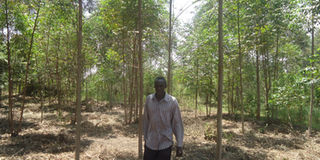Farmers to get paid for trees

A man walks in his tree farm. More than 40,000 farmers are to benefit from environmental projects as Uganda earns Shs660m from carbon credits
What you need to know:
The Food and Agriculture Organisation (FAO) is working on guidelines to enable Sub-Sahara Africa countries to benefit from a scheme known as Payment for Environmental Services.
The Food and Agriculture Organisation (FAO) is working on guidelines to enable Sub-Sahara Africa countries to benefit from a scheme known as Payment for Environmental Services.
According to Pauline Nantongo Kalunda, executive director, Environmental Conservation Trust of Uganda (Ecotrust), this means there is value attached to the ability for the forest to provide clean air, clean water and there is a market out there for those services.
Participate
However, Ms Kalunda noted that countries in Sub Saharan Africa, Uganda inclusive, have not been very attractive beneficiaries to this market.
“There are thousands of farmers in Uganda that have participated already in this market. There is a programme called Trees for Global Benefit that mobilises farmers that grow trees on their land,” she said, adding that trees on each land store carbon dioxide.
A value is then aggregated and sold on international market by private companies.
She explained that the amount of money that one gets depends on the amount of environment services provided or carbon storage.
A case in point is the more than 40,000 farmers in Uganda who have been rewarded carbon credits for the trees on their land.
“This workshop has brought experts from around Africa to ensure people benefit from this initiative,” Kalunda said at a workshop which was held in Kampala. The theme was “Payments for Forest Environmental Services in Sub Saharan Africa”.
Enabling environment
“Through practical guidelines, that we are trying to validate, we hope that will be able to provide Uganda and other governments with information on alternative possibilities on how they can better manage the available resources,” said Foday Bojang, a senior forestry officer, FAO Regional Office for Africa.
“As part of our mandate, we provide capacity development for governments to create an enabling environment to enable for them implement these activities,” he added.
Carbon credits
In January, Uganda became the first country to earn carbon credits worth $215,135 (Shs660m) from its waste compositing projects aimed at mitigating climate change. The country had absorbed 16,549 metric tonnes of carbon dioxide thereby being awarded by the UN Framework Convention on Climate Change.




